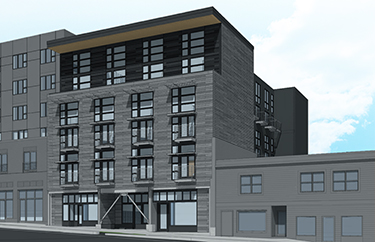|
Subscribe / Renew |
|
|
Contact Us |
|
| ► Subscribe to our Free Weekly Newsletter | |
| home | Welcome, sign in or click here to subscribe. | login |
Real Estate
| |
 Brian Miller Real Estate Editor |
July 12, 2018
On the Block: Farewell, Cedars. Hello, Common. First Hill site flips from SRO to 200 efficiency units
The first thing you notice is the smell. It's not septic, not mold, not exactly toxic or dangerous… just dusty and redolent with the small sad stories of so many forgotten tenants in an old SRO on First Hill.
All but a few of them are gone as I tour the three-story, century-old former Fenimore Hotel at 510 Broadway with one of the new owners. The shared bathrooms are, well, icky. And the basement trove of discarded possessions — skis, bicycles, luggage, washboards, manual typewriters — looks like the end of “Citizen Kane.” (The contents are bound for Goodwill, a Rosebud perhaps among them.)
Did you even know there were any remaining single room occupancy hotels in Seattle?
I had thought that — after the notorious 1970 Ozark Hotel fire, which killed 20 — most all SROs had been fire-coded out of existence. That's why so many old unreinforced masonry buildings in Pioneer Square are empty above the first floor — no sprinklers, and no seismic bracing. (It's also a contributing factor to our homelessness crisis, but that's a story for another day.)
Only a few SROs continue to operate — apparently legally — in the International District, for reasons I've never understood.
But an SRO on First Hill? Across Broadway from Swedish Medical Center? With Seattle University just to the east? And the streetcar and bike lane running in front? And the trendy Pike-Pine corridor a short walk away?
Yes, Brad Padden of Anew Apartments explains, the Fenimore was operated as an SRO by the Onishi family for seven decades. Then Padden and his partners at Anew bought it last year for $4.5 million. Tenants have been gradually leaving since then.
The midblock site measures 7,200 square feet.
The plan, by Neiman Taber Architects, is to begin work this summer on a gut rehab and one-story addition to 510 Broadway that will up it from 40 SRO units to a very modern, market-rate 86 congregate dwelling units and SEDUs (small efficiency dwelling units).
STS Construction Services is the general contractor. Padden says they're close to securing final permits, and that completion is expected next year.
Anew will continue to own the property, its third renovation/addition project in the area.
It may be operated by Common, a management company now entering the Seattle market. Anew's two prior projects will take the Common name: Common Terry, with 112 rooms at 423 Terry Ave.; and Common Summit, with 49 rooms at 1722 Summit Ave.
Next, on the corner to the south at 500 Broadway, Anew has the little Cedars restaurant building under contract to buy. Anew plans to demolish it and develop a seven-story apartment/hotel building that will effectively become Phase II of Common Broadway. Padden estimates that the two buildings will total about 200 units.
Cedars has operated at the corner of East Jefferson Street since 2012. The Khan family, which founded the original U District Cedars in the mid-1970s, bought the property in 2010 for $1.4 million. When Padden was talking to the Khans about the construction next door, they expressed an interest in selling. “It would be great to have both,” he realized, and now he does.
Neiman Taber will also design 500 Broadway, which will be Anew's first ground-up construction project. Padden hopes to begin in 2019, and finish by 2021.
At 510 Broadway and the Fenimore, Padden hopes to keep or recycle as much of the building as possible — the floors and beams are sound, he says. “The bones were really good.” The rats' nest of wiring, plumbing and mechanical systems will be redone. “We're gonna do a full seismic upgrade.”
Padden, a former EMT with an engineering background prior to entering real estate, emphasizes tenant safety: Everything will be up to modern code. “I'm really psyched. This is a massive project. I wanna do as many as I can.”
The 510 Broadway plan will be mostly congregate units, plus about 14 SEDUs. Most will have sleeping lofts, and units will be added to a daylight basement level — effectively yielding a five-story building.
As with Anew's prior two renovation projects, the building will not get a new elevator. “Most of our residents love steps,” says Padden optimistically.
Two commercial bays will face Broadway, with a combined 1,200 square feet. Total project size is about 30,824 square feet — up from 20,334 in the current layout. A bike room will have 51 stalls.
The 510 Broadway basement and foundation will be completely reconfigured with new footings and shear walls, plus patios and sliding doors for the new units.
When the structural and seismic work is done, 510 Broadway will be removed from the city's notorious list of at-risk unreinforced masonry buildings (URMs). Padden describes it as “one of my own personal missions” to make such URMs habitable again.
And when discussing future investment opportunities, he cites the city's long roster of URMs. “We're trying to actively buy more buildings. We've identified about 300 buildings that have piqued our interest. The hardest thing is finding willing sellers.”
In a follow-up statement, he added, “The Fenimore Hotel had been providing similar substandard ‘naturally occurring affordable housing' when we acquired it. I know our city has a desperate need for more affordable housing, but the solution can't be to sequester those folks in unsafe, seismically vulnerable unreinforced masonry buildings teeming with bed bugs and cockroaches.
“There's got to be a more socially equitable way to provide homes for people in need. We're committed to finding a way to do it, while preserving smaller scale buildings that help contribute to the character of our neighborhoods.”
500 Broadway, the Cedars site, will have some combination of congregate housing units, SEDUs, and hotel rooms. No parking is required; there will be a bike room with 100 stalls. Some amount of commercial space will face Broadway. (Padden doesn't know if the Khans will want to reopen the Cedars there.) The property is zoned up to 85 feet. It measures 7,200 square feet.
“This is gonna have a roof deck and an elevator,” says Padden. “We're gonna share amenity spaces.” Tenants will be able to access the two separate buildings with their key fobs to use the bike rooms, laundry, roof deck, etc.
Anew's founding partners are Brad, wife Lauren Padden, and Sarah and David Sharkey. They also have investors. Their m.o. is to buy older apartment buildings and reconfigure them with more and smaller units.
Thus the old Summit Inn (now Common Summit) was converted from 23 units to 49 congregate units. It's fully leased. And the century-old, four-story former Broadmore (aka Common Terry) was just converted from 33 apartments into 55 congregate units and 57 SEDUs.
One such deal that didn't work out is the Roy Vue Apartments, at 615 Bellevue Ave. E. The plan, floated earlier this year, was to convert Roy Vue from 34 to 147 units (including an addition in the courtyard). That ran into considerable opposition from tenants and preservation groups.
“We walked away from it,” says Padden, and the building remains under the same longtime ownership.
Padden says of Anew's philosophy, “We're trying to build more apartments and preserve housing. I don't call them affordable. I call them workforce.”
With congregate units, “The building is your home. The neighborhood is an extension of your home.” Anew likes neighborhoods like Capitol Hill and First Hill where there's “density of amenities” — meaning shops, bars, easy transit connections, etc.
“We're hoping to be here for 50 years,” says Padden.
Anew intends to build a portfolio, not sell.
The co-living startup Common was founded three years ago by Brad Hargreaves, who said in a statement, “Seattle has long been on our radar for expansion. We've found the perfect developer partner in Anew Apartments, who shares our commitment to creating quality housing that fosters a true community. These two buildings were already well-designed for co-living, and we look forward to bringing our unique offering to the city.”
Based in New York, Common now has 20 properties in five premium markets, including San Francisco and Chicago. It secured a $40 million investment last year from Norwest Venture Partners.
Rents for Common Terry and Common Summit begin around $1,200. Amenities include weekly cleaning of shared spaces, high-speed Wi-Fi, community events and the ability to transfer between Common properties. That latter feature might be a useful selling point for mobile millennial tech workers shuttling between assignments in different cities. It's also the same niche being mined by WeLive, the sister company to WeWork.
(Editor’s note: Press material used in the original story incorrectly said rents would start at $1,600 per month.)
Hargreaves is also a founder of the education startup General Assembly, which has an office in Seattle.
Got a tip? Contact DJC real estate editor Brian Miller at brian.miller@djc.com or call him at (206) 219-6517.
Previous columns:
- On the Block: Ballard to bid farväl to Vaupell Plastics as industrial turnover there continues, 06-28-2018
- Rainier Square's big lease to Amazon is on again, so what about that hotel?, 06-21-2018
- On the Block: Third & Virginia plan now is for a 48-story tower with 459 condos, but no rooftop dome, 06-14-2018
- Demand grows for self storage — but so do restrictions on developing new facilities, 06-07-2018
- On the Block: Fore! Marquee on Meeker tees up 492 units on part of Kent's Riverbend Golf Complex, 05-31-2018
- On the Block: Rare sighting in Ballard: a condo conversion, 05-24-2018
- On the Block: Southport is a game-changer for Renton, with Class A offices and plans to expand, 05-17-2018
- On the Block: Capitol Hill Housing, Mithun have plans for key Broadway site held by Seattle Central College, 05-10-2018



